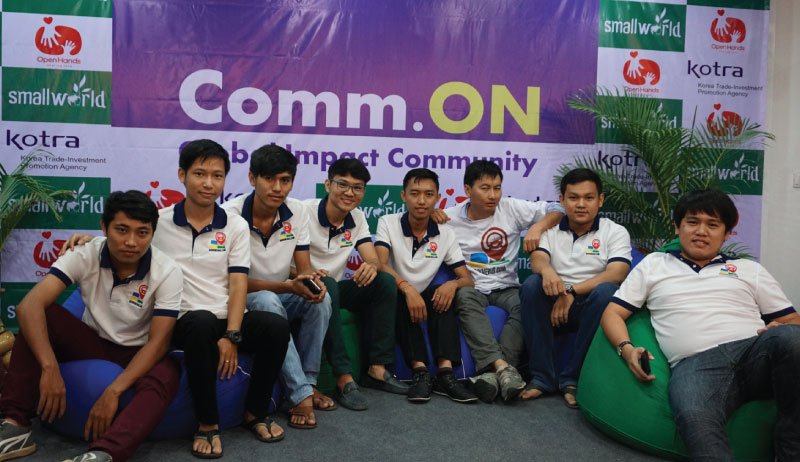
Join Cambodian fast growing startup and innovate Cambodian travel industry!
BookMeBus
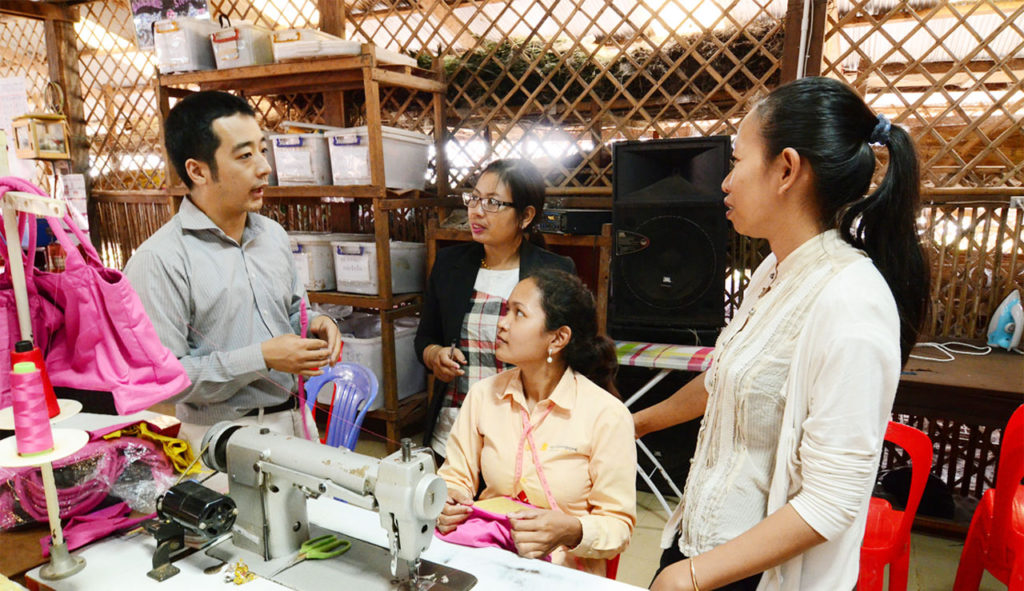
Now it has been common sense to incorporate business into international cooperation. I interviewed Kenta Aoki, co-founder of Kamonohashi Project (Kamonohashi) which is known as one of the pioneers of social enterprises.Now Kenta decided to be independent of his NGO and started a new handmade brand called “SUSU”. He tries to create a place to build “Life skills” of Cambodian women born in poorest families through producing handmade products.
Everyone who is interested in the poverty issue may have heard the word “Empowerment” at least once. Kenta who is active at the forefront of it told me that he did not have a desire to involve in international cooperation. What kind of person is he like? Let’s explore SUSU brand story and Kenta’s values and his way of being.
Yusi: At first, please explain your current projects.
Kenta: Our current project is a school-like project building Cambodian women’s life skills in the process of business. We call “School in Business” ourselves. Many of poorest women in rural villages dropped out primary school and have jobs of daily labor of agriculture. First I thought about what kind of skills are necessary for them in order to get good jobs in urban areas or to build good relationships at home and in the region.
While spending with them and observing them, I came to an idea that the power to solve problems, the power to build relationships with people, self-management skills, or more fundamentally self-confidence, several powers of these are required for them. If they acquired these skills, even if Cambodian economics and industries would change, who are able to create own path will increase, I thought so.
So I started a project building women’s skills while producing handmade products, we hire women from 16 years old to 24 years old for two years and provide pieces of training while working and then they will work at companies and factories after graduation. In a sense, it’s a school, and from a different perspective, it’s a social business.
Specifically, 80% of their time is making products. Like on-the-job training, we try to achieve goals step by step together. Other 20%, we focus on life skill training. For example, we teach literacy and incorporate calculations of a 10-by-10 grid of numbers recently.
To say more abstractly, Problem Solving as I told just now, building relationships with people, and occupational ethics, we provide such pieces of training which are provided for new employees. While integrating a game into training, how do we deliver a message to women? We develop training with a cooperation of Japanese training company.
I heard you did not have what you wanted to do originally. At the time when you established Kamonohashi, why did you decide to help Sayaka, co-founder of Kamonohashi? (Kamonohashi is based on Sayaka’s idea and vision.)
Thinking back now, I guess I wanted to get a reason. I was not the type to think like I want to do this, so I think I was looking for something that I would be excited with friends or an issue making us becoming as one. That’s why I feel like I thought she was interesting when she told her clear thought to involve in child trafficking… She is crazy.
She had a conviction that “I was born to solve this issue (child trafficking).” In a calm way, that can’t be true.
On the other hand, I was poor at proceeding with things steadily with looking in front, in other words, I could not do something with much consciousness. I adored such conviction but I didn’t have, something like that. I could say I have been easy-going…
To speak a little more carefully, I like people, interesting things, and the atmosphere of a festival. So I feel like I attended places where I could feel such an atmosphere and I made such atmosphere by myself. That’s why until that time, I had put importance on whether I would be able to be excited in rather than what theme I would engage in.
Doing a new business in Cambodia independently from Kamonohashi, now I feel “I” made a decision by myself most.
So, I was attracted to Sayaka who had an own theme and I think that I wanted to do something together at that time.
By the way yesterday I went to SUSU shop. I bought a tote bag in spite of myself because it was very fashionable and highly designable. Please let us know the concept of products and the origin of the name “SUSU”.
Thank you for buying our product. SUSU means “Good luck” in Khmer and it is the word used when people cheer others. We have used often this word each other among women and office staff from long ago. Not only the word sounds well, but also actually there are two “Good luck” meanings. The first meaning is that we want to give “Good luck” to women doing their best in villages. we want to say “SUSU” to women who keep moving forward even in the hard family environment and social environment.
At the same time, there is another meaning. We want to give such positive energy to people who buy SUSU.
Because, working at NGO, I often realize that women who are working hard give energy to us and we would be able to work hard too. I feel that the positive thoughts and the positive changes which people in a difficult situation have given us positive energy. I want to make SUSU cheering buyers
When buyers use our product in their country, somehow they remember people produced this product by hand lives with efforts bit. It’s OK such a sense that can not be worded. Feeling like warm or going to do my best too… I hope that SUSU becomes such products cheering buyers.
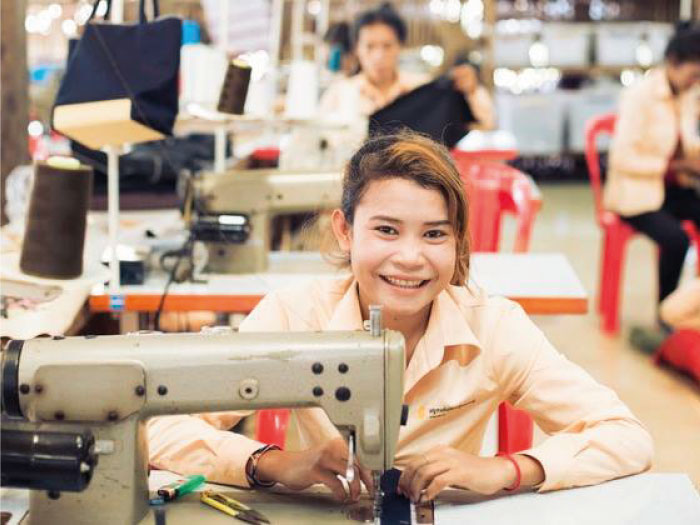
“When someone is faced with a challenge,
Cambodians express their support with the word “SUSU!”.
Our products are all handmade by women in Kchass village in Cambodia.
They embody the warmth and attentive care of their creators.
Despite their difficult situations,
these women continue to smile as they pursue their dreams.
From the bottom of our hearts— “SUSU” to you!”
You have experienced running projects in both of Japan and Cambodia. About launching a project in a developing country, I would like to hear the difference from Japan, daily stress, and worth doing.
Of course, I feel differences a lot. I feel gaps on the side of living as well. And Cambodians and I have different experiences, a different history, and different education. Various things are different. That’s why the common sense and the ideal image are different so the cost of communication is high. I tend to give up telling them perfectly.
For example, when staff brings up the subject of leaving, in brief, the topic will be the relationships between work and oneself, many Japanese people working at NGOs are working there because they really want to work at NGOs. There are even people who declined job offers from private companies. Many Japanese put a high priority on work and the relationship with companies/NGOs is quite important for them.
On the other hand, for Cambodians, there are few people to sympathize this thought. Work is just a tool to live and work is a place to develop an own career. It means that work is an important tool to protect a family. Especially in the context of NGOs, the relationship with work is different from Japan, so if I forget it, I would be perplexed easily. It’s not about whether Japanese way or Cambodian way is better. Anyway, there is no answer.
Go back to the subject, Japanese people and Cambodians have different ways of thinking about work. So it’s natural that Cambodian staff suddenly tell me “I left this job because I want to raise my salary and my career!” even though an important project is still going on. In brief, there is a culture of job hopping in Cambodia. On the other hand, for us creating a project is that somehow cooperating with others from zero resources. We have tried to do how to train that person, how to share a dream together and how to dream together.
Especially if you were a member of management, I can say you share your body with projects so, through the process of sharing your dream, your time, and your values, the hope for managers or next management members would increase. You know, train staff because I expect them. But if I expect, I will get really hurt when staff intends to leave because of the various difference as I told just now. Oh, my… like this. But when I experienced impressive 3, 4, and 5 times, my mind will be ready at the moment when it is told that “I have something I want to talk a little” even if we have got along well. I feel like “Your time comes, too?”
I can’t imagine the sense of sharing your body with projects. When did you get the most hurt?
I become not to hurt than before, I have cried so terribly before. One Cambodian staff cried terribly and I have cried loudly while driving a motorcycle.
It’s also difficult not to be hurt. One of the solutions is not to expect staff. However, every day is boring unless you expect them. So each hurt becomes like scabs although, I try to used to it or I try to change my way of thought. I think that “I produced a promising Cambodian youth again” to convince myself.
On the contrary, when do you feel happy or feel satisfaction?
People close to me or people who know my name, I pretty love changes and growth of such people surrounding me. I feel worthwhile when I see people
I feel worthwhile when I see people, regardless Japanese or Cambodian, managers or women in villages, live actively and vigorously with senses of being able to live positive and excited. For example, a manager’s vision was changed a lot, his/her words became to carry weight, or he/she became a stable person. I am rewarding in such a case.
Flatly speaking, my role is to support, how members of this organization accomplish own life goals with comfortable by using this field and how they make efforts to accomplish goals with energy, these are my achievement. That’s why I want to support them to work lively, help them to solve problems, set fields. I don’t think I am a captain, recently I call myself that I am a port rather than a captain. It’s like hope you guys come back sometimes. I name it “Port type leadership” by myself. I want that everyone is a captain.
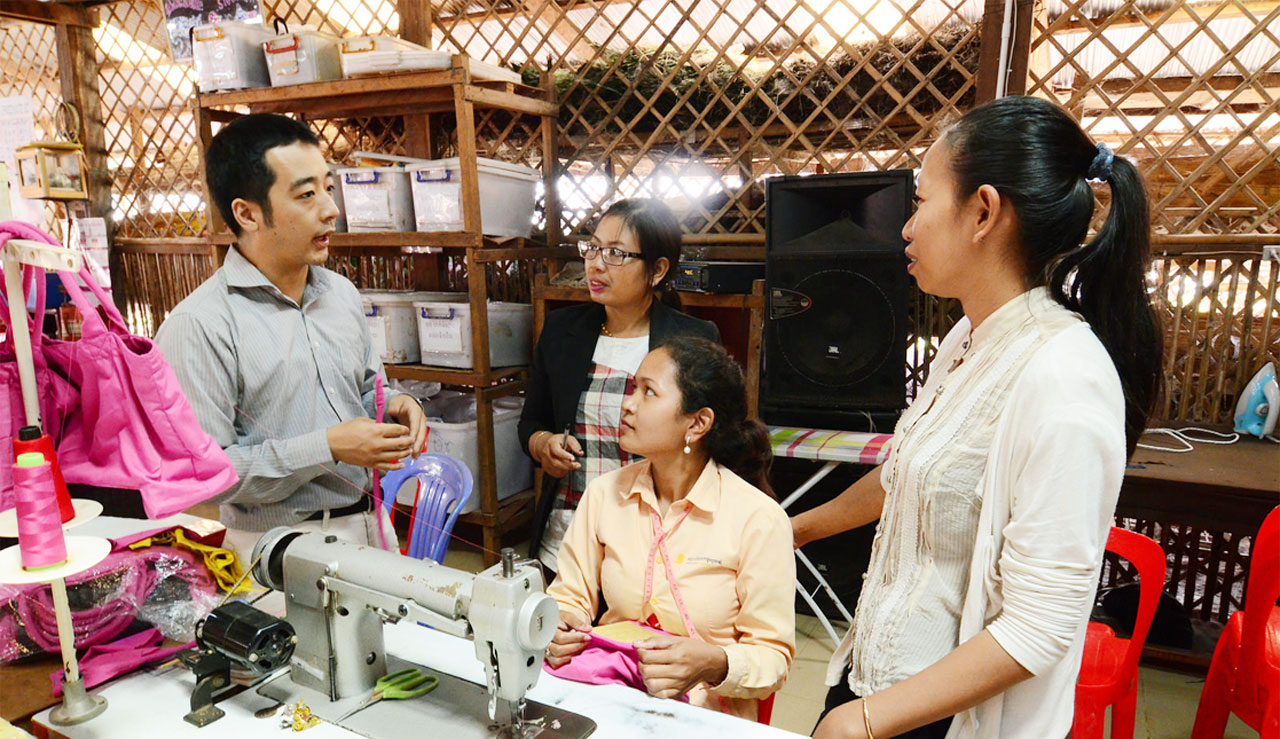
I heard that one of the SUSU’s missions is empowering women, I’d like to ask about it a bit. In the case of Kamonohashi, you have a goal as creating the world without child trafficking. But I think in India, you have a project currently, there are brokers who don’t think child trafficking is bad. Although they have different values on “Good” and “bad”, how do you involve in the local issue as an outsider and how do you set a goal?
For example, in the world, there are communities where crime is the basic source of living. There are a network and children in communities regularly get trafficked are sold to a certain brothel in a city. Of course, some of them hurt their heart but such values still persisted and in India, there is a role of “a woman shared in a village” in a traditional system. We can say “it is a tradition” or “it is a sense of values.”
The reason we board there and point out that is bad, it is because there is a concept of “justice” or “human rights” somewhere on our side. I mean that it is the battle of a sense of values that we impose such concepts. We are doing a fight changing their consciousness with conviction by suggesting that this sense of values might actually be happier, might make the world go around better, or might make your life stable as well.
Even so, for me, I’m not good at imposing a specific sense of values to people. So I am doing it with the feeling that I only impose my ego that I want you to be excited at least. Empowerment in the meaning of providing opportunities, abilities, and environments for people to do what they want to do, this word sounds best for me.
You expressed your hope that everyone gets excited as “ego”, I got the impression that you are looking at your own business objectively. How do you face with people who don’t want to get excited?
That’s an interesting question. What I care about is that not saying “Everyone, let’s get excited!” to everyone like Shuzo Matsuoka. (He is a Japanese former professional tennis player and he is known as the most passionate guy in Japan) The word, “You should get excited!”, is violent and perhaps some people think “I don’t get excited by choice!” Even if you just say so to those who especially writhe in agony, your word is not going to reach them. Moreover, you might hurt them. That’s why I don’t want to tell like that.
In the world, we need so-called Shuzo, but I am a different character from him and If everyone asked you should be excited, it is painful living in such a world like “Be excited!!!” I think I am interested in the weakness of those who don’t agree with this.
To sum up, I think I am originally interested in that there are people feeling difficult to work hard. When someone tells me “it’s hard to work hard for me”, I think “Yeah, I know.” I know there are a lot of people have grown and succeeded even they were born in any complicated environment and people who can work hard can work hard.
This causes that we tend to grasp as a duty to do our best, but I won’t forget that one of the reasons why I can work hard now is that what I received from my family and the society has supported me.
It is one of my insights through running this project, I have spent a really lucky life. Regardless of my effort, my self-esteem was built, I’m confident, and I can choose whether I do my best or not at the moment.
I realized that when I visited the house of a woman who took absent from work. The woman told me “I have no motivation anymore and I don’t want to work.” At that time, I got bewildered and thought “You should not say so.” Rather, I would like to deliver my message while closely following such movements of the mind. After I know the reason why she would think like that.
You know, the words, I and other staff tell her, have fewer impacts on her than the education she has received or the influence from her parents. And the message she has received from the education and her family may be different from our message. In that mean, sometimes I think that I do not know if my message, business, and training within it can change that person.
Even so, I deliver this message not only to her but also other women in villages and my colleagues. I think that asking the sense of values is the way of my life. Simply, from my own experience, I think it becomes easier to live based on such sense of values, I have a hope that makes them happy. That’s why I want to deliver my message and I want everyone to try this way.
Working together is only 2 or 3 years on average, however, I believe that there is some impact on them somehow through discussing and working together. It is not just about talking but I cherish that I try to be honest and excited to work. But then again, I don’t have any other ways. In our internal word, we call this way of being as “Be naked”, I would like beneficiaries and colleagues to do like me…
What do you mean “Be naked” ?
Oops, I’m sorry it means as it is. You know, usually, people wear some “clothes” or “armors” because they think it’s essential for their life. It’s about “what we should be” like in this case, we should behave like this or in that position, we should behave in such a way.
So I mean I think that it’s good if we have a chance to be released like getting off “clothes” or at least being aware that we wear “clothes”. Specifically, whether you do base on “what you should be”, you do by hearing your heart, or the public voice you imagine asks you to do, there is a huge difference even you decide yourself.
Then, when we get off “armors” and face ourselves or other people, we are unprotected and we may pretty hurt by what others say to us. Even if “armors” are attacked it will not hurt but being naked and talking with people, we may be hurt.
For example, when someone is disappointed to my organization and decide to leave, I try to hear their opinions without “armors”. Then I would face dissatisfaction with my management and organization. At that time, if I wear “armors”, I can make any excuses. “Because that is the director” or “Organizations should be like that, so there was nothing I could do” like these armors would protect me.
It is important in some ways but when I get off “armors” and I dialogue with myself like “How seriously have I faced what this person said? What points have I not been able to do? What have I been able to do?”, I can’t make any excuses and I would be hurt. But at that point, there are something triggers of the way of being and working more lively without lying to myself. “Being naked” is about such attitude. I learned it from my teacher.
To sum up, what I want to tell the story of “Being naked” is the sense of hearing your own heart or authenticity. In another word, I want you to try to be conscious of the sense of yourself. I think I have asked people to have the sense of such value.
You mentioned about the sense of oneself, could you let us know if you have some recommendations about the way of spending college life?
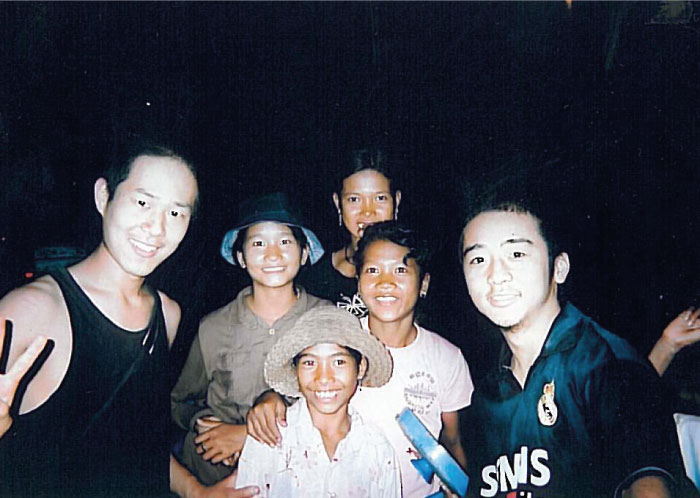
Kenta visited Cambodia with a co-founder Mr. Motoki for their field survey to establish Kamonohashi when he was a the second year university student.
I only seriously went to college for about six months, lol but, I understand you are worried about how you spend your college life. For example, do not you think that you should not seek jobs with half-hearted feelings, or you may fail if you handle a variety of things? I think in such a case, what I recommend you keep your eyes on is the mental model itself.
The mental model assumes “In the world, there are correct answers like ‘the best way’ and ‘the best relationship’ and judge yourself whether you choose the correct answer”, right? I think the model is wrong itself. Whatever we do, everyone is completely different and the situation is also different. The know-how is depended on industries and the character of a boss is different too. Depending on a boss, what he is talking about yesterday and today may be different lol. Yesterday’s answer may be wrong today. So I think it is wrong that you think that you fail if you don’t choose the correct one among correct answer and wrong answer. I think it is more important that you have a sense not to caught in anxiety and to choose an option you can be honest.
Because the question, what you should do in school days, is not a good question. Everyone does not know which way makes oneself happy. I don’t have answers as much as whether you should start your own business, whether you should break up with your boyfriend. Emotions and relationships have made you what you are so I think that you have no choice but to prepare yourself to face your character and your current relationships with others and to try to find a better way.
I know you don’t want to live with anxieties so I understand you want to decide your whole career quickly and get an answer in the early twenties, but I think it is difficult in real. Rather, even if you misunderstand the relationship with the voice of others and follow that, you seem to be thinking about your future but actually, you don’t think yourself. Simply you may be forced by vague anxieties like appearances. I understand young people decide based on such things but I dislike such “you should do blah blah”.
For example, I often say “I can’t do that!” when someone tells me “Kenta, you are a manager so please do like this.” I don’t want to be the ideal manager demanded by the society, I only can proceed the project while making full use of my goodness without exceeding my limits. But, I don’t think freedom in the sense of no discipline is right. I mean that I’m sure that managers’ natures present an infinite variety. That’s why when someone tells me “Manager should do in this way”, I think that the manager who you have seen was so, but that is not everything.
There are students who have not found their dreams, could you give them your positive advice?
Positive advice lol. The cause of that you don’t have energy, get bored, or feel unhappy is actually there is a pretty systematic and complicated issue. So I think this issue is not simple as I could say it depends on your mind. It’s natural that you have these feelings and I know it’s hard to overcome yourself. However, to tell the things you should take care when you think “What is suitable for me?” or “What is worthwhile for me?”, it’s like I don’t say anything but I would like to say that you will not find out until you do, you should do various things before you judge.
For instance, if you have a question whether you are good at leadership or good at supporting, many people analogize oneself like “Because I have always played the role of the deputy representative in a club so far and it has been going well. So I guess I am suited for a deputy representative rather than a leader” and they start their job hunting based on this hypothesis. But actually, they have not experienced a leader and they may be suitable for a leader. Or they may know only specific types of leadership. Actually doing a leader may work very well. In short, the analogy from own few experience is completely different, or there is a lot of bias. Then to deepen your thought, it is good that to stop thinking like “It’s impossible for me because I am X type” and not to give up doing things you are interested in.
Once again, to find out who you are, you have to do something with your full effort. This is a hard and fast rule. Suppose we assume your current duty (work/study) as 100 if you have 5 things you feel love, it’s OK just doing that with your whole heart. You don’t have to take care of your current duty. For example, devoting your utmost to regional activities or playing Pokemon GO as a recent topic, when you explore around yourself, I’m sure you will find something attracts you. It is also optimistic, but as you take a step, there are a lot of things in the world so… I think you need to do like that at least.
At that time, it’s only important whether you want to put your heart into that. Even if other people don’t understand, that’s no matter. Staying home and doing nothing is also important if you put importance on it. I don’t want but it sounds like preaching…
Anyway, if you are interested in our project by reading this article, I hope you to join us as an intern. This is my recommendation lol.
Thank you so much for sharing your entrepreneurial journey! And lastly, please tell us the future vision of SUSU and your eagerness.
I have two dreams. One is delivering our education for women to more people while improving our power. Currently, about 60 to 65 women work with us but even if I do my best I can hire new employees for around 30 people per year. As it is, I can only provide our education service to about 30 to 40 people every year. But, for example, perhaps it might be possible to provide the essence or concept of this education elsewhere.
To put it more concretely, how about trying to provide training expertise cultivated here to women working at private companies and factories, or how about delivering to the vocational training school or Cambodia’s school. Actually being able to create an own path by acquiring this life skill is common not only in Cambodia but also anywhere. So I think about providing our service in other countries. I would like to change various places into places people can learn.
The other one is a thought for SUSU’s business and producing which I am proceeding as the important process of learning for women. As we make products, I want people who buy our products are pleased with our products and love our products. Because the fact that they provide value to people and please them will be really a key factor in building women’s self-esteem. I hope people who buy our products are able to feel women’s stories close and I wish I could cheer any percentage of the feeling that they will do their best. I want to build our brand with a close relationship with customers and Cambodian women.
In 2002, he established Kamonohashi Project with two other co-founders when he was a college student. And since 2008, he moved to Cambodia in order to manage the project in Cambodia. At the time when Kamonohashi decided to end the support for Cambodia in FY 2017, he decided to go independent from Kamonohashi. In February 2016, he started the handmade brand “SUSU” and now he makes efforts to empower Cambodian women in villages through building capacity by producing.
SUSU shop info
Opening hour: 1pm – 10pm (Monday – Sunday)
Address: Pari’s Alley, 14 The-Lane Krong Siem Reap, 63000, Cambodia
Tel: +855-93-633-866
HP: susucambodia.com
Facebook: susufromcambodia
Instagram: @susu_cambodia
What I most impressed through the entire interview is the sense of his relationship with others.
I’m not sure how to explain, it’s like a sense of separation. He loves people. That’s why he respects that others are different from him and I feel it is the core value of his project and it is one of the big attractive parts of his character.
And, Kenta told me that positive changes of people around him make him happy most and he doesn’t mean to involve in international cooperation. As he called “Port type leadership” by himself, he is pleased when people around him feel happy with work by his support. And he affirms that some part of his motivation is based on his ego. As I am a graduate of international development and anthropology, I had always concerned about myself and others in theory, but through conversation with Kenta, I again realized that enjoying things myself is the most important thing and affirming it is just natural.
Work with Cambodian Entreprener
Work with Visionary Entreprener